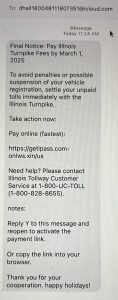Illinois Tollway: Think before clicking on texts
By Bill Dwyer For Chronicle Media — March 8, 2025
A fraudulent text, purportedly from the Illinois Tollway, says the recipient owes toll fines. (Photo by Bill Dwyer/For Chronicle Media)
The Illinois Tollway is warning residents to beware of texts that are designed to get individuals to click on links that will enable the sender to defraud them.
Since late February there have been numerous reports of fraudulent texts sent to recipients, purportedly from the Illinois Tollway, warning of overdue tollway fines and threatening collection action.
Several members of the Chronicle Media staff have received such texts in recent days, as have other media outlets.
One fake “final notice” refers to Illinois Turnpike fees, saying, “To avoid penalties or possible suspension of your vehicle registration, settle your unpaid tolls immediately with the Illinois Turnpike.”
There is no Illinois Turnpike, of course. The fraudulent texts also usually have intentional erroneous information. The texts sent last week incorrectly advise, “Need help? Please contact Illinois Tollway CustomerService at 1-800-UC-TOLL (1-800-828-8655).”
That is incorrect: the Illinois Tollway customer service telephone number is “800-UC-IPASS” (800-824-7277).
Illinois Tollway officials acknowledged they have been alerted to the text-message phishing scam “claiming that recipients owe money for unpaid tolls.”
“These are not legitimate messages from the Illinois Tollway,” officials said in a press release. “When you recognize a phishing message, do not click on any links or attachments. Delete the email message from your Inbox and then empty it from the deleted items folder to avoid accidentally accessing the websites to which it points.”
The tollway’s customer call center hours have been temporarily extended to 8 p.m. due to higher than normal call volume.
Tollway officials urge anyone who has received a suspicious text to “please check your account online…or call our customer service center at 1-800-UC-IPASS (1-800-824-7277) from 7 a.m. to 8 p.m. on weekdays.”
Tollway officials also ask that anyone receiving such phishing texts “file a complaint at www.ic3.gov.”
That site is dedicated to sharing information on Internet crimes across law enforcement agencies.
Such phishing scams are not new. Experts in both law enforcement and private security say fraudsters rely on basic human psychology to foster anxiety in message recipients and cause them to react automatically without thinking things through. The messages all have a “pay now or else” tone that are designed to trick you into giving out information you should not reveal.
The FBI monitors trends in what are called “phishing” and “spoofing.”
Spoofing, the feds says, “is when someone disguises an email address, sender name, phone number, or website URL—often just by changing one letter, symbol, or number—to convince you that you are interacting with a trusted source.”
Phishing schemes “often use spoofing techniques to lure you in and get you to take the bait,” the FBI says.
In an April website post, “Highway to hell: Toll SMS phishing scams,” online security firm Guardio warned of a rise in tollway SMS (text) phishing scams “across several states and countries.”
The goal of any phishing text or email is always the same, Guardio says: “To trick you into handing over sensitive information under the guise of clearing unpaid tolls.”
However, once a phishing target clicks the link to what appears to be a legitimate website, he or she is urged to enter personal information and credit-card details in order to settle the purported debt.
“The fear of incurring late fees often trumps any initial confusion or doubt you might have about the legitimacy of an unexpected bill,” Guardio says.
Most people, they say, feel anxious when faced with such accusations, and “are inclined to settle their bills promptly to avoid additional charges and potential financial headaches.”
That is exactly what scammers hope to elicit when they exploit the average person’s alarm and sense of urgency over receiving such messages So if — or more likely, when — you get such a text or email message, the best thing you can do is remain calm.
The FBI has outlined several steps to take if you find yourself targeted by phishing attacks:
- Carefully examine the email address, URL, and spelling used in any correspondence. Scammers use slight differences to trick your eye and gain your trust.
- Always check your toll account through the official service website rather than clicking on any links in the suspicious messages.
- Don’t click on anything in an unsolicited email or text message. Look up the company’s phone number on your own (don’t use the one a potential scammer is providing), and call the company to ask if the request is legitimate.
- Remember that companies generally don’t contact you to ask for your username or password.
- Be careful what you download. Never open an email attachment from someone you don’t know and be wary of email attachments forwarded to you.
- Set up two-factor (or multi-factor) authentication on any account that allows it, and never disable it.







